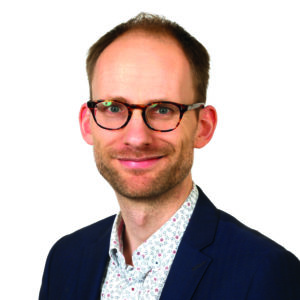Guido de Graaff is a senior member of the St Augustine’s teaching staff, teaching Doctrine and Ethics as well as being Director of Studies. We asked him to talk about himself, his role and what he thinks St Augustine’s College of Theology offers our students.
A bit about me
My theological studies began in a very different church context, in the Netherlands, but what was similar was the sense that learning was always focussed on church life and ministry. After studying Theology at college, instead of going down the route of becoming a priest or vicar, I opted to make what was, for me, a big jump, to do postgraduate study abroad. That brought me to the UK and Oxford, where I began a Masters which became a PhD.
When I decided to look for a job in academia, I was recommended for a teaching role at St Augustine’s College of Theology (then SEITE).
That was 10 years ago, and since then I’ve learned a lot about the pastoral side of teaching, education and vocation. In some ways, it’s not that different from the college I studied at, but the big difference is that most of our students tend not to be coming to us straight from school. They tend to have worked or completed other studies first, and got some life experience. Many have families and established secular careers.
My role
I tutor in Doctrine and Ethics, as well as being personal tutor for, usually, around 15 students. So I’m responsible for their pastoral care and guidance, and maintaining an overview of their programme or formation. I also look after the Masters students.
Part of our admissions process is often to talk in detail with prospective ordinands and students about their programme and how it can be fine-tuned to meet their particular needs. Every student’s needs are different, so they end up with an individualised pathway; designing those is usually my responsibility. I really enjoy meeting those new faces and hearing their stories – then working out how to make it work for them and seeing it take shape over the years they are with us.
I also have an important role as Director of Studies in making sure that we constantly monitor and maintain the high academic standards that we require, and that are demanded of us by the University of Durham, our accrediting university. That means I’m responsible for managing and steering the ongoing development of all our theological programmes, keeping an overview of the curriculum and setting policies on assignments and assessments. In a large university that would be the equivalent of a Programme Director for a particular department – but because we’re quite a small college I’m responsible for all the programmes. I make sure all our shared modules work with each other, and in this, I work closely with Natasha and Simon, two other members of the teaching staff, to make sure that all the pathways for ordinands, lay readers and independent students weave together.
What do you think is special about St Augustine’s?
It’s not necessarily unique to us, but I think it’s really important that no-one coming to theological college should assume that they are coming to a place where everyone is just like them – just as they can’t assume they’ll end up somewhere like that once ordained. Being open to others, and being challenged, is perhaps the most important part of their learning and formation here. That may initially take them out of their comfort zone, but in the end, as part of our community, everyone comes to appreciate it.
Since moving to Malling Abbey as our Kent centre a few years ago we’ve concentrated our places of teaching there and at Trinity House in Southwark. We’re not constantly together, but that sense of place and community is incredibly important, especially as we continue to live and work in our own communities. It’s good to hear how our students themselves speak about the college as a community; in social terms but also in terms of locality and place.


